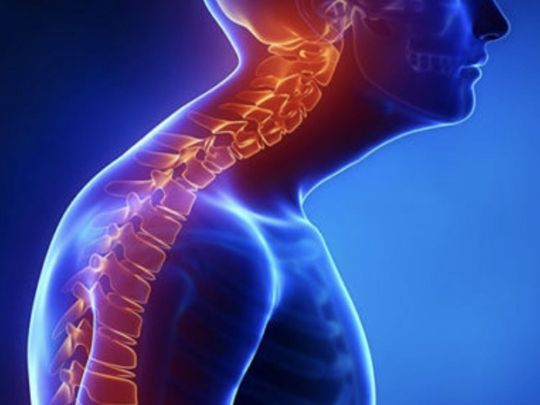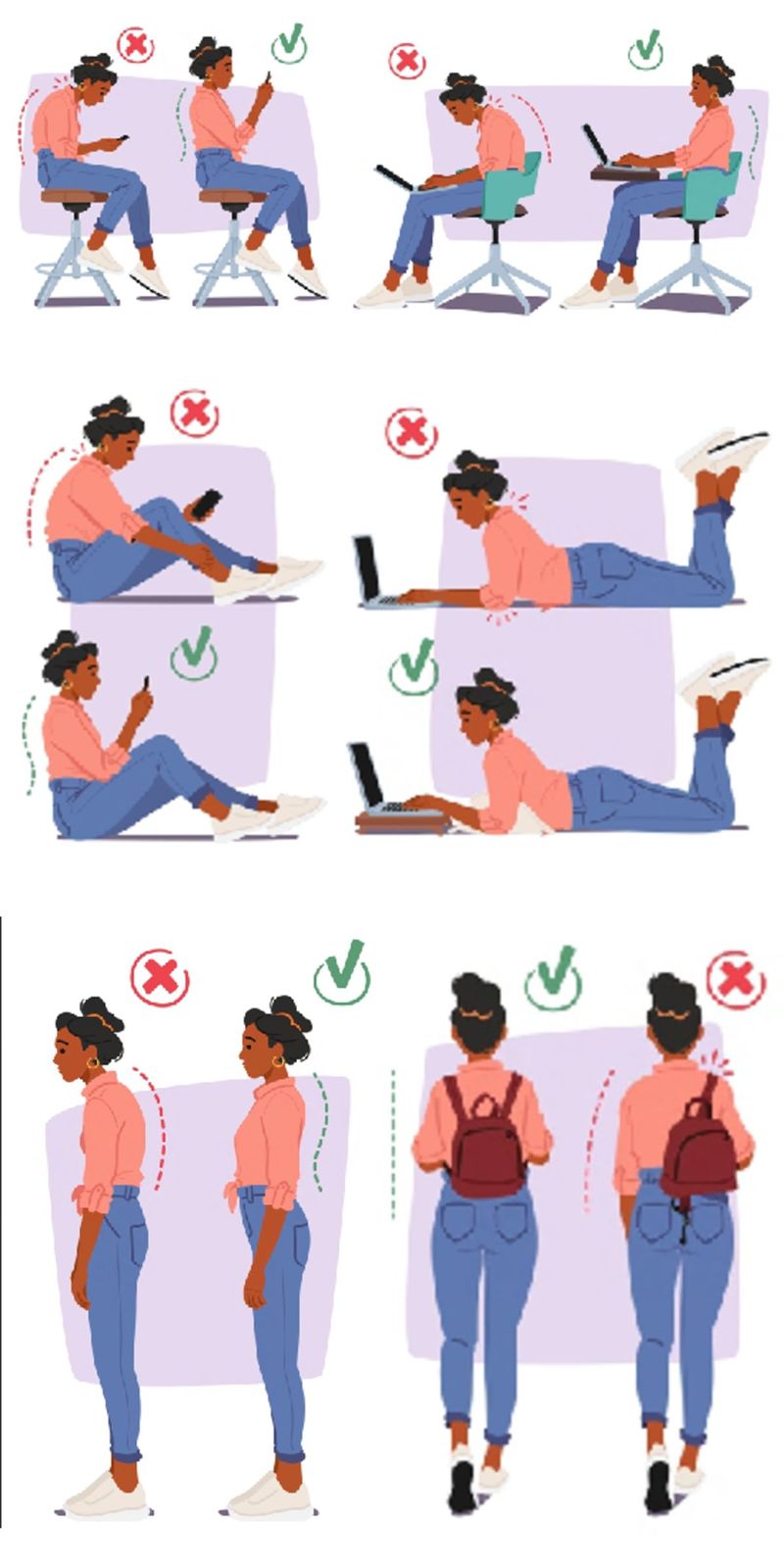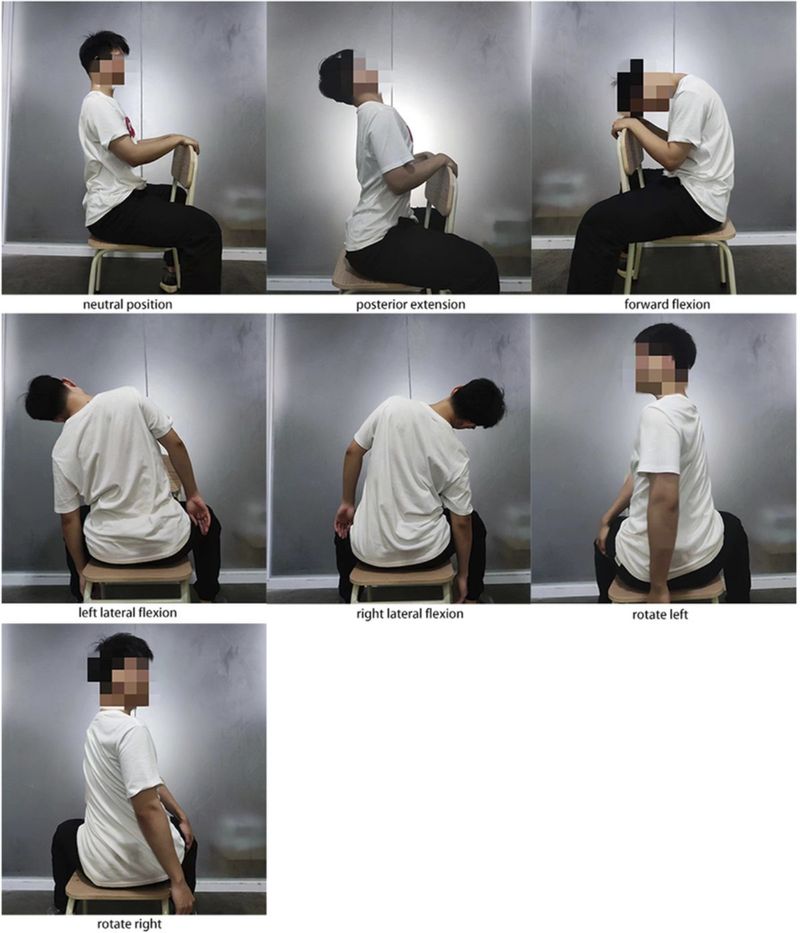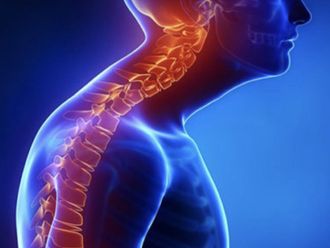
Dubai: Have you ever found yourself hunched over your desk, or slouching on the couch, seemingly lost in the moment?
While it might feel comfortable in the short term, the long-term consequences of poor posture can be nothing short of a dramatic health nightmare.
Poor posture is like a domino effect, studies show. It sets off a cascade of health problems.
It starts with a simple slouch, but quickly evolves into a symphony of pain and discomfort.
Your neck aches, your back throbs, and your shoulders feel like lead weights. But the suffering doesn't stop there.
A breath of fresh air, literally
Poor posture can even constrict your lungs, making it feel like you're gasping for air in a sealed chamber.
Your body struggles to get enough oxygen, leaving you feeling drained and fatigued.
Moreover, wrong posture also triggers chronic issues such as lower back pain and sciatica.
There are several studies pointing to the importance of good posture – and the detrimental effects of poor sitting positions on health – especially in work and daily life environments.
These are some of the negative effects of poor posture:
#1. Increased risk of spinal issues, lower back pain/sciatica
The Journal of Occupational Health published findings showing that poor sitting posture, especially prolonged slouching or sitting in a non-ergonomic chair, is a significant risk factor for developing chronic back pain, spinal disc herniation, and even spinal curvature issues like scoliosis.
A 2007 study led by Angela Maria Lis and published in the European Spine Journal made a statistical measurement of association (or “risk ratio”) between lower back pain (LBP) and/or sciatica and occupations where sitting is the major physical requirement with co-exposure factors such as whole body vibration (WBV) (example: motor vehicle driving) and awkward postures.

The team found a “strong” association between sitting for more than half of the work-time and the presence of sciatica.
The researchers found the prevalence rates for reported sciatica in all the occupations analysed were “two to three times” higher than their correspondent control groups.
#2. Poor blood circulation
Poor posture can also hinder your blood circulation, causing your legs and feet to swell and increasing your risk of blood clots. Even your brain isn't immune to the negative effects of poor posture.
A recent demo, posted by Bryan Johnson on X, shows how he discovered through an MRI that his posture was trapping blood in his brain, blocking it from flowing properly to his heart.
By restricting blood flow and oxygen to your brain, poor posture can impair your cognitive function, making it difficult to concentrate and remember things.
Earlier, in 2022, researchers led by Hao Wang, of the Sports Rehabilitation Research Center, China Institute of Sport Science, in Beijing explored the effects of trunk posture on cardiovascular and autonomic nervous systems.
The team, who published their study in the journal Frontiers in Physiology, asked their human subjects to perform 7 different postures:
(1) a neutral trunk position (upright sitting posture),
(2) posterior extension,
(3) forward flexion,
(4) left lateral flexion,
(5) right lateral flexion,
(6) rotate left,
(7) rotate right
They then checked the subjects’ haemodynamic indicators: cardiac output (CO), stroke volume (SV), stroke volume variation (SVV), Stroke volume index (SVI), Cardiac index (CI), heart rate (HR), etc.

SV is the volume of blood ejected during ventricular contraction or for each stroke of the heart.
The study found that compared with the SV in the neutral trunk position, the SV of the other six postures decreased to varying degrees. “The reason may be that the six postures caused the reduction of the thoracic volume, which reduced the left ventricular end-diastolic blood filling volume and decreased preload.”
“At the same time, the increase of intrathoracic pressure leads to the rise of cardiac afterload, and the decrease of cardiac preload and the growth of afterload work together to cause the SV to decrease.”
#3. Digestive disaster
Your digestive system is also a victim of poor posture. Slouching can compress your abdominal organs, leading to a sluggish digestive system that can cause everything from heartburn to constipation.
A 2019 study in Digestive Diseases and Sciences found that slouched sitting positions can compress internal organs, impair digestion, and lead to problems such as acid reflux and constipation.
The compression of the abdominal cavity hinders the digestive system’s ability to function optimally.
#4. Decreased productivity and energy
A 2007 research published in the journal Applied Ergonomics demonstrated that poor posture leads to increased fatigue, reduced productivity, and lower levels of physical and mental energy.
Research led by George Generalis and published in the European Journal of Social Sciences, also highlighted the impact of ergonomics (application of scientific information about human beings) on productivity. One case study cited: a workplace of electronic assemblers designed based on ergonomic principles. Using a redesigned console, the time taken by each operator to complete a task was reduced by 64 per cent with 75 fewer errors.
The study employees with poor posture reported greater instances of exhaustion and burnout compared to those with proper ergonomic setups.
#5. Mental meltdown
The effects of poor posture aren't just physical. They can also take a toll on your mental health. Studies have shown that poor posture can lead to feelings of depression, stress, and low self-esteem.
According to a study in the Journal of Behavior Therapy and Experimental Psychiatry, people who habitually slouch may experience increased levels of stress, anxiety, and depression.
The physical act of slouching is associated with feelings of helplessness and lower energy, which can negatively affect mental well-being.
In a landmark study “How Posture Affects Memory Recall and Mood” published in April 2017 in a special issue of Biofeedback, investigators explored the relationship between posture and mood among 216 college students (average age: 24.6 years).
The students participated in a regularly planned-classroom demonstration regarding the relationship between posture and mood. This study found that posture significantly influenced access to negative and positive memory recall. It confirms an earlier study (2004, Wilson and Peper), which shows that the collapsed/slouched position was associated with significantly easier access to negative memories.
“This is a useful clinical observation because ruminating on negative memories tends to decrease subjective energy and increase depressive feelings,” the researchers concluded.
These studies illustrate that adopting proper sitting positions not only prevents physical ailments but also boosts overall well-being, productivity, and mental health.
Breaking free from the slouch
The good news is that you can break free from the chains of poor posture.
Here are a few tips to help you stand tall and feel your best:
Mindful posture: Pay attention to your posture throughout the day. Even small adjustments can make a big difference.
Core strength: Strengthen your core muscles to support your body and improve your posture.
Take breaks: Get up and move around every hour to avoid staying in the same position for too long.
Seek professional help: If you're struggling with chronic pain or posture problems, consult a physical therapist for personalized guidance.
By taking these steps, you can reclaim your posture, improve your health, and live a more vibrant and fulfilling life.
Studies on the benefits of improved sitting positions
Here are some key findings from research: Benefits of improved sitting posture
Reduced musculoskeletal pain: A study published in the European Spine Journal found that improving sitting posture, especially using ergonomically designed chairs, significantly reduces lower back pain. The researchers observed a reduction in discomfort in the lumbar region and fewer instances of pain-related absenteeism from work.
Enhanced breathing and circulation: Research from the Journal of Physical Therapy Science shows that an upright sitting posture improves lung capacity and breathing efficiency. When the spine is aligned correctly, it allows for better lung expansion, leading to improved oxygen flow and overall circulation.
Improved cognitive function and mood: A study in Health Psychology indicated that good posture can boost cognitive performance and mood. Sitting upright was found to increase alertness, confidence, and overall energy levels, while slouched postures were linked to fatigue and a lack of motivation.
[This article is for informational purposes only and does not constitute medical advice. Please consult a qualified healthcare professional for personalised medical guidance, diagnosis, or treatment.]










